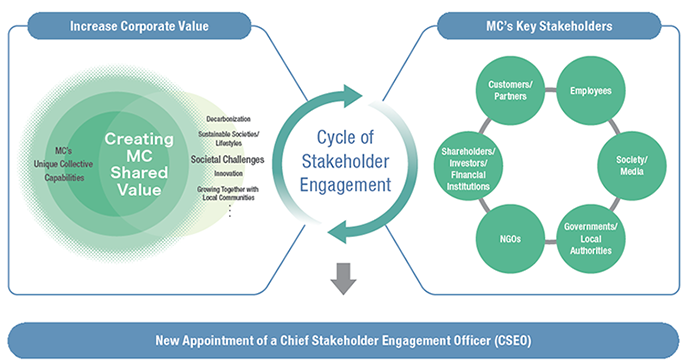With the Three Corporate Principles as its core philosophy, MC has continued to grow together with society by addressing societal issues. The MC Group seeks to increase its corporate value in the medium to long term against a global backdrop of rising uncertainty and unpredictability, including geopolitical and economic shifts, changes in industrial landscapes driven by technological innovation, and evolving societal values. To this end, we believe it is vital to accurately grasp the demands and expectations of our diverse stakeholders through engagement and dialogue, and to reflect these in our Group management.
MC has established a system to reflect stakeholder opinions into company management by incorporating external perspectives into the Board of Directors and its advisory bodies (the Governance, Nomination & Compensation Committee and the International Advisory Committee) as well as the Sustainability Advisory Committee. With these and other initiatives to engage with its various stakeholders, MC aims to achieve sustainable growth through the collaboration of value by engaging our stakeholders.

With the Three Corporate Principles as its core philosophy, MC has continued to grow together with society by addressing societal issues. The MC Group seeks to increase its corporate value in the medium to long term against a global backdrop of rising uncertainty and unpredictability, including geopolitical and economic shifts, changes in industrial landscapes driven by technological innovation, and evolving societal values. To this end, we believe it is vital to accurately grasp the demands and expectations of our diverse stakeholders through engagement and dialogue, and to reflect these in our Group management.
MC has established a system to reflect stakeholder opinions into company management by incorporating external perspectives into the Board of Directors and its advisory bodies (the Governance, Nomination & Compensation Committee and the International Advisory Committee) as well as the Sustainability Advisory Committee. With these and other initiatives to engage with its various stakeholders, MC aims to achieve sustainable growth through the collaboration of value by engaging our stakeholders.

MC will contribute to the development of societies and economies by providing a stable supply of products and services that meet the needs of customers and business partners across a wide range of business areas, from upstream raw material procurement to downstream retail, and by working with its customers and business partners to develop various businesses that it could not have realized on its own. Moreover, as a company that handles a diverse range of products and services worldwide, MC is working to achieve a sustainable supply chain as a key issue.
In response to the further diversification and globalization of its businesses, MC is working to develop human resources and support their success on a global, consolidated basis, with the aim of ”Fostering Vibrant Workplaces That Maximize the Potential of a Diverse Workforce”. This is to establish vibrant workplaces where MC’s diverse and versatilegroup of employees, regardless of gender, nationality or other attributes, are able to demonstrate their unique abilities to the fullest.
MC strives to gain understanding and support of its business and management strategy through the timely and appropriate disclosure of information and enhancement of disclosure materials, as well as through briefings and individual meetings. At the same time, MC works to maximize corporate value by reflecting in its management the opinions and demands of shareholders and investors obtained through dialogue with them.
We believe that building relationships with society and the media is important for the promotion of our business. Through communication, we strive to receive their opinions and requests, and to gain their understanding and support for our management philosophy and strategies, as well as our stance on social issues.
e.g. Corporate Website, News Release, Official SNS, Sponsored Events
We recognize NGOs as key stakeholders that function as representatives for the planet and its citizens, and we seriously consider the opinions and requests raised through our robust communication on a day-to-day basis and use them to improve our initiatives. Moreover, we are promoting collaborations with NGOs to address environmental and societal issues.
To achieve improvements and provide solutions to societal issues through our global business operations, we engage in collaboration, joint initiatives and dialogue with public sector bodies through our involvement in business associations, public-private initiatives and other forums, with the aim of contributing to societal development.